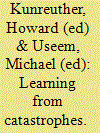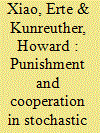| Srl | Item |
| 1 |
ID:
092064


|
|
|
|
|
| Publication |
New Jersey, Wharton School Publishing, 2010.
|
| Description |
xvii, 332p.
|
| Standard Number |
9780137044856
|
|
|
|
|
|
|
|
|
|
|
|
Copies: C:1/I:0,R:0,Q:0
Circulation
| Accession# | Call# | Current Location | Status | Policy | Location |
| 054549 | 363.34/KUN 054549 | Main | On Shelf | General | |
|
|
|
|
| 2 |
ID:
145989


|
|
|
|
|
| Summary/Abstract |
Previous findings on punishment have focused on deterministic environments in which the outcomes are known with certainty. In this article, we conduct experiments to investigate how punishment affects cooperation in stochastic social dilemmas where each person can decide whether to cooperate, when the outcomes of alternative strategies are specified probabilistically. Two types of punishment mechanisms are studied: (1) an unrestricted punishment mechanism—both persons can punish—and (2) a restricted punishment mechanism—only cooperators can punish noncooperators. We compare behavior in a two-person deterministic prisoner’s dilemma game (DPD) with a two-person stochastic prisoner’s dilemma (SPD). In all treatments, participants are given information on the other person’s actions. We find that in both games, the restricted punishment mechanism promotes more cooperative behavior than unrestricted punishment. However, the difference in the degree of effectiveness between the two mechanisms is smaller in the SPD game than in the DPD game because noncooperative behavior is less likely to be punished when there is outcome uncertainty. Our findings provide useful information for designing efficient incentive mechanisms to induce cooperation in a stochastic social dilemma environment.
|
|
|
|
|
|
|
|
|
|
|
|
|
|
|
|